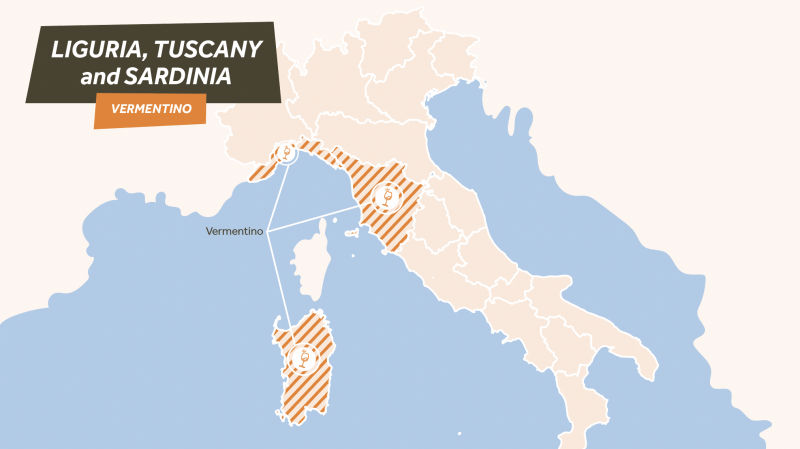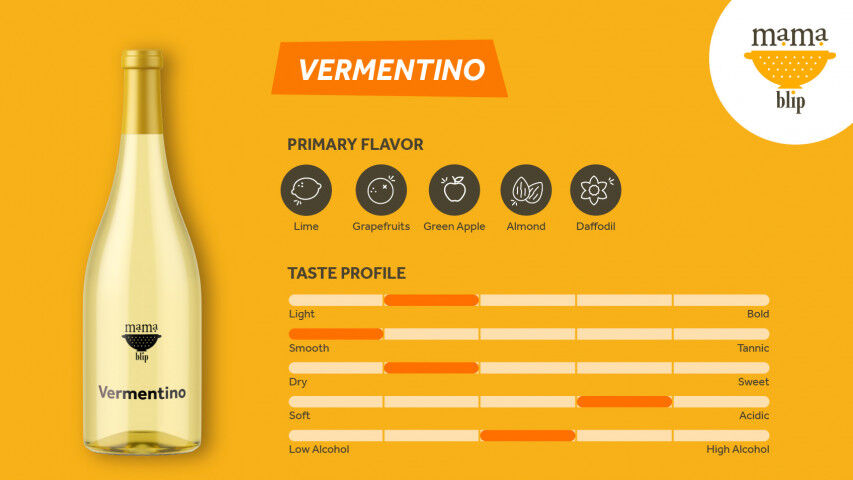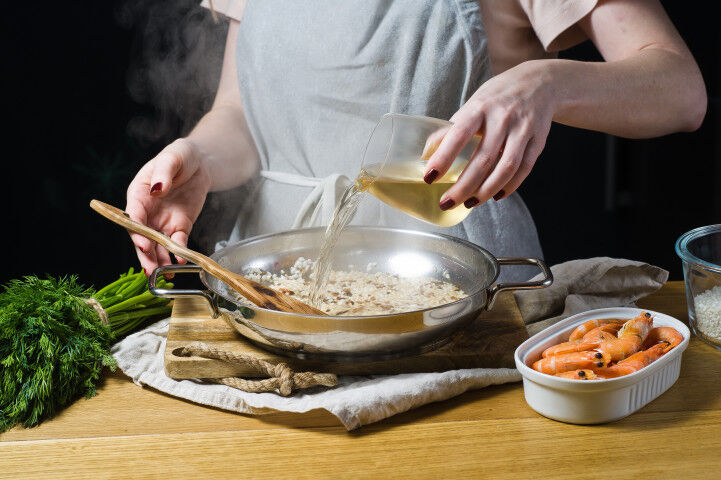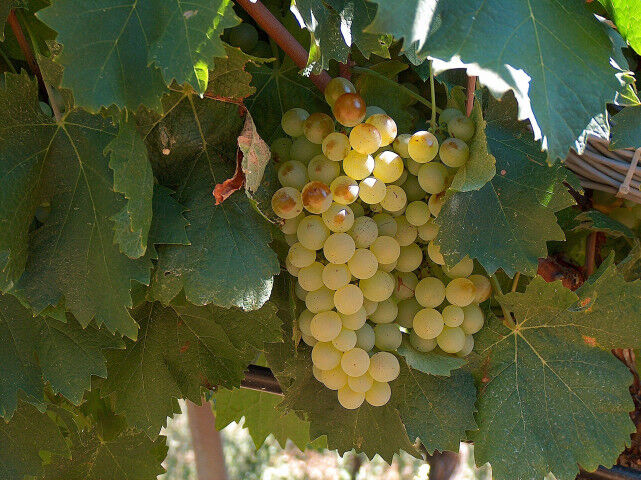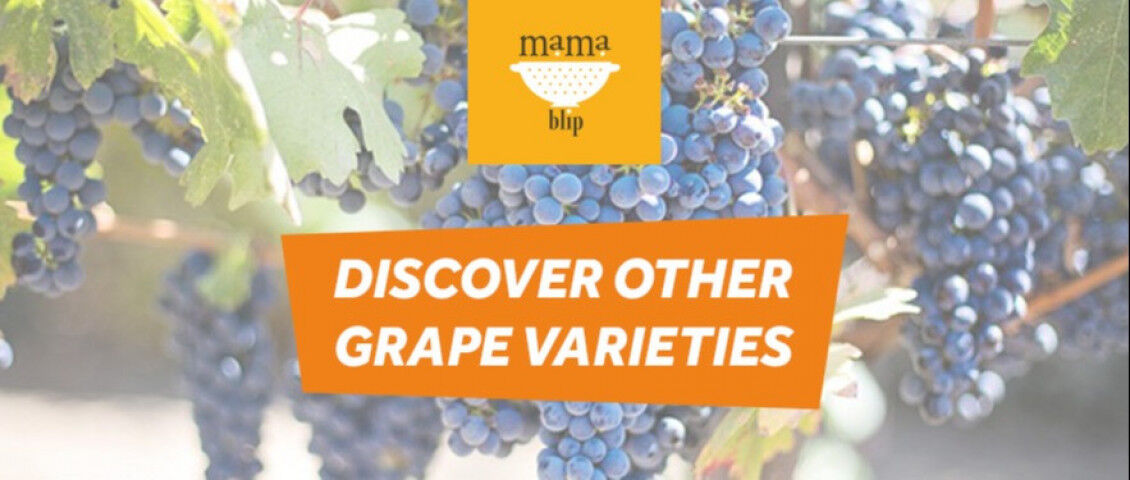Vermentino wine ( grapes) in 30 seconds
• Vermentino makes fragrant still dry, sparkling, passito, and late-harvest wines.
• Most Vermentino grows in Sardinia and Tuscany.
• Mutant (a good thing in viticulture!) varieties grow in Liguria as Pigato and Piemonte as Favorita.
• Vermentino displays citrus, tropical fruit, herbs, almonds, florals, and saline minerality.
• Wines have a light to medium body and medium to high acidity.
• Vermentino appears across around 30 DOCs and DOCGS.
• Its most famous appellation is Vermentino di Gallura DOCG in Sardinia.
• Alcohol level ranges from 11.5% to 12.5%.
What is Vermentino wine?
A key white grape in Sardinia and Tuscany, Vermentino produces wines that are layered with fruit, herbal notes, and minerality. With biotypes in Liguria and Piemonte, this characterful white wine can be found on many an Italian dinner table, or in a refreshing glass on its own.
Learn about Vermentino
Vermentino appears in mainland Italy, Sardinia, southern France, and Corsica under a variety of names. Biotypes in Liguria and Piemonte are known as Pigato and Favorita respectively. In the south of France, its name is Rolle.
Ampelographers are undecided about the extent to which these grapes are closely related but it’s generally understood that they are biotypes or clonal mutants of Vermentino. Whatever the name, these wines share a great deal in common in their aroma and flavor profiles as well as structure.
Vermentino makes still, dry, sparkling, passito, and late-harvest wines. This variety also makes mono-varietal and blend wines.
What does Vermentino taste like?
Vermentino expresses citrus, tropical fruit, dried herbs, almonds, light florals, salinity, and minerality. It has a light to medium body and medium to high acidity.
Vermentino Wine Styles
This varietal produces wines in a stull dry style along with sparkling, passito, and late harvest styles.
What does Vermentino pair well with?
Vermentino boasts bright lush fruit, a wash of minerality, and good acidity ̶ all features that make it a good food wine. The key to successful food pairing is to keep in mind its acidity and sweetness level. The following tips will offer some inspiration:
Sparkling Vermentino Food Pairing
This style is ideal as an aperitif or a welcome drink.
Still Dry Vermentino
- Appetizers: Charcuterie; green olives; stuffed vine leaves; roasted vegetables; grilled artichoke.
- Entrées: Creamy, cheesy truffle risotto; calamari; spinach quiche; pesto pasta; grilled halibut; chicken tacos; garlic roasted trout; pork dishes; seafood; sushi; tempura.
- Cheese: Goat’s cheese; mozzarella; ricotta.
Medium-Sweet to Sweet Vermentino (Passito and Late-Harvest)
- Appetizers: Charcuterie; herby bread-coated mushrooms; fondue; lightly spicy Indian finger food (samosas).
- Entrées: Lobster dishes; roast veal; lamb dishes; suckling pig.
- Desserts: Italian donuts; biscotti; Ricotta cheesecake.
- Cheese: Blue cheese; Comté.
Where is Vermentino native to?
The origins of Vermentino puzzles researchers. Some are convinced the grape arrived in Italy from Spain. Others think it hailed from the Middle East and came to Italy with the ancient Greeks of yesteryear.
Ampelographers believe Vermentino has been cultivated in Sardinia since the 1300s, albeit under different names throughout the centuries.
Outside Italy, Vermentino grows under the name of Rolle in France as well as the US, Argentina, Lebanon, and Australia.
How is Vermentino made?
Still, Dry Vermentino
To preserve the lovely fruit profile of this variety, grapes usually undergo a light pressing and short skin contact for more flavor extraction. They ferment in stainless steel to further promote the fruit and age for three or four months on lees for textural enrichment. Finer examples of Vermentino are commonly kept on lees for six months for more complexity while the winemaker simultaneously remains careful about protecting the signature fruity notes.
Passito and Late Harvest Vermentino
Sweeter styles of Vermentino are a result of passito or late harvest. In the passito process, grapes dry indoors on straw mats following harvest to concentrate sugars and flavors. Late harvest has the same effect through grapes being left a little longer than usual on the vine.
Sparkling Vermentino
Frizzante Vermentino is usually made with the charmat method where a second fermentation takes place in a tank. Spumante Vermentino can be made with the tank method or the traditional method. The latter is more prestigious and sees a second fermentation in bottle as well as longer aging for deeper integration of flavors and properties.
